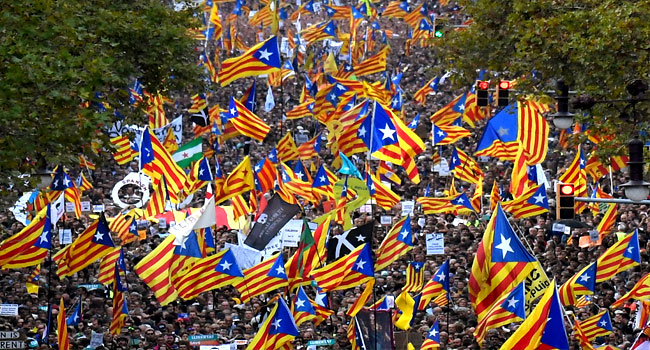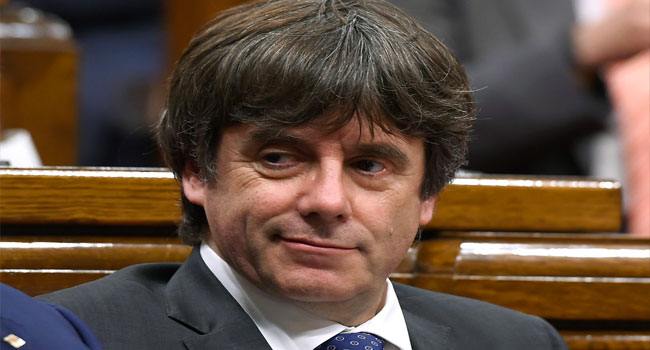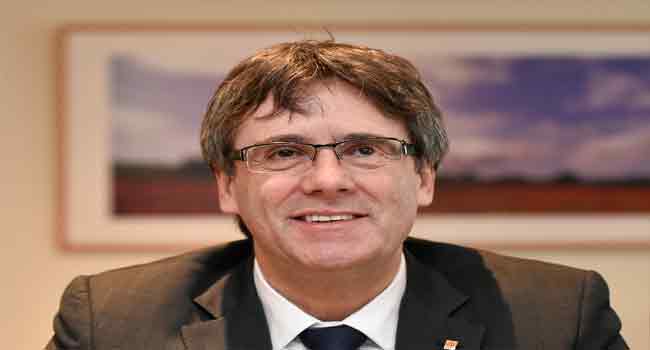Catalonia’s sacked leader Carles Puigdemont on Tuesday called on pro-independence parties to unite for next month’s regional election as he aims to recapture power and push on with a divisive secession bid.
Ahead of a notional midnight deadline for parties to decide if they wish to run individually or as part of a coalition, Carles Puigdemont said separatists needed to maintain a united front for the December 21 vote.
“We have no option but to go all in together,” he told Catalan radio.
Puigdemont, who was dismissed by Madrid after the Catalan parliament declared independence last month, is in Belgium facing extradition on charges of rebellion and sedition.
The crisis has deeply divided Catalans and seen hundreds of businesses move their headquarters out of the wealthy region, home to 7.5 million people.
Puigdemont has said he is prepared to run as a candidate on December 21, but it is far from clear whether or not he will even be in the country by then.
In the region’s last elections in 2015, the “Together For Yes” coalition — composed of left-wing party ERC and Puigdemont’s conservative PDeCAT — delivered a majority with 72 seats out of the 135-seat parliament, aided by their smaller ally, the far-left CUP party.
Although parties still have until later this month to officially register on electoral lists, politicians in Madrid will watch closely for any possible cracks in the pro-independence front.
– ‘Wave of repression’ –
Although the separatists won a majority of seats in 2015, they captured less than half of votes cast, and polls show Catalans remain split over independence.

LLUIS GENE / AFP
Spain’s deepest political crisis in decades has reignited fears over its ability to recover from the financial crisis and exposed officials in Madrid to allegations of heavy handedness in their response.
A court last week ruled that eight Catalan ministers deposed by Spain after declaring independence be remanded in custody on charges of rebellion, sedition and misuse of public funds.
Puigdemont himself and four former ministers are due to appear next week in front of a Belgian judge after Spain issued a European arrest warrant and demanded their extradition.
The deposed leader on Tuesday claimed he had fled Spain in order to avoid a harsh crackdown from Madrid.
“I’m absolutely convinced that the Spanish state was preparing a harsh wave of repression and violence for which we would have all been held responsible,” he told Catalan radio, without elaborating.
The Catalan independence crisis is now Spaniards’ second largest concern after the country’s rampant unemployment, according to a poll published Tuesday.
A survey by the Centre of Sociological Studies in Madrid found that 29 percent of respondents said they were now more worried over the fate of the region than by corruption (28.3 percent).
– General strike, protests –
The parliament of Catalonia, which under Spain’s constitution enjoyed strong autonomy on areas such as policing and education, declared unilateral independence on October 27 following a disputed referendum on the issue.
Madrid’s response was to suspend Catalan autonomy, dissolving parliament and taking control of the region’s police force and public departments. It also called the December 21 vote.
Fears that such a move could provoke widespread unrest in the region — which accounts for a fifth of national GDP — have yet to materialise.
But pro-independence groups have held several large protests calling for the release of former ministers and a general strike has been called for Wednesday.
Around 200 pro-independence Catalan mayors flew to Brussels Tuesday and held a protest demanding the release of their region’s “political prisoners”.
AFP




